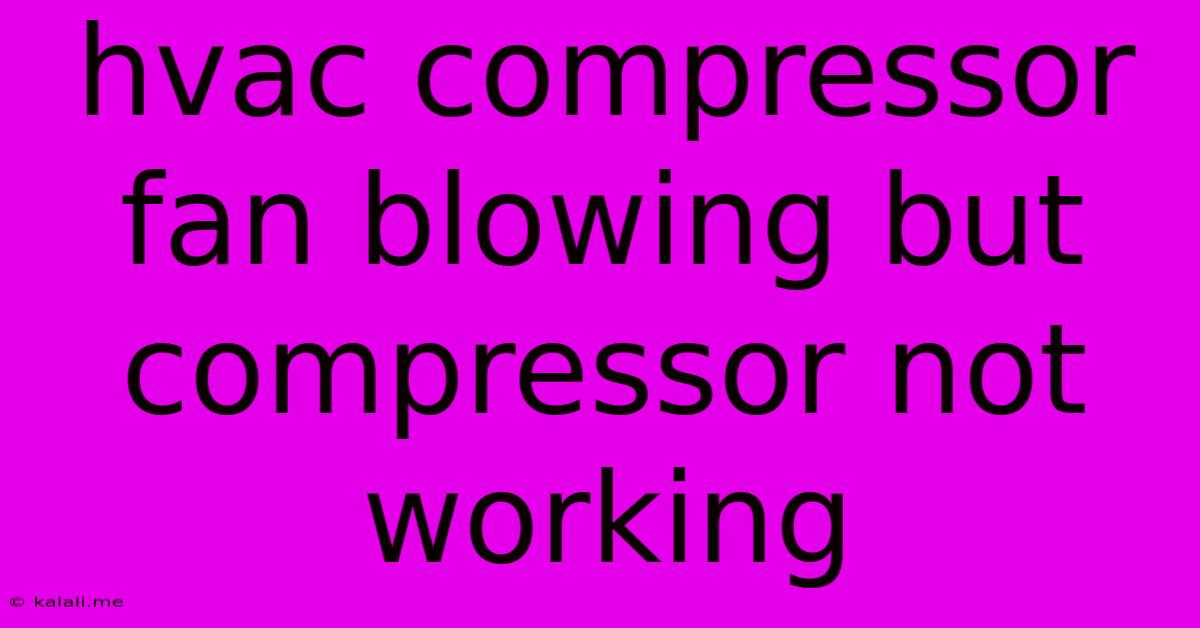Hvac Compressor Fan Blowing But Compressor Not Working
Kalali
Jun 08, 2025 · 3 min read

Table of Contents
HVAC Compressor Fan Blowing But Compressor Not Working: Troubleshooting Guide
Your HVAC system's fan is diligently blowing, but the compressor remains stubbornly silent? This common issue can leave you sweating (literally!), but don't panic. This guide will help you troubleshoot the problem and potentially save you a costly service call. This frustrating situation usually points towards a problem within the compressor's starting components or a related electrical issue, rather than a problem with the fan itself.
Understanding the HVAC System Basics
Before diving into troubleshooting, let's briefly review how your system works. The compressor is the heart of your air conditioner or heat pump, responsible for circulating refrigerant. The fan, on the other hand, circulates air over the evaporator coil (cooling) or condenser coil (heating). When the fan runs but the compressor doesn't, there's a disconnect in the system's power flow or a malfunction in the compressor's starting mechanism.
Common Causes & Troubleshooting Steps:
Here's a breakdown of potential culprits and how to investigate them:
1. Low Refrigerant:
- Explanation: A low refrigerant level can cause the compressor to shut down to prevent damage. This is a safety mechanism. However, it's important to note that a low refrigerant level is usually accompanied by other indicators, like poor cooling or heating performance before the compressor completely fails to engage.
- Troubleshooting: This requires professional attention. Attempting to add refrigerant yourself can be dangerous and void your warranty.
2. Capacitor Issues:
- Explanation: The start capacitor provides the initial surge of power needed for the compressor to begin. A faulty capacitor is a common reason for a non-starting compressor.
- Troubleshooting: This requires some technical knowledge. Do not attempt this if you are not comfortable working with electricity. A failing capacitor will often be visibly bulging or leaking. If you suspect a capacitor issue, it's best to call a qualified HVAC technician.
3. Contactor Problems:
- Explanation: The contactor is an electrically operated switch that connects power to the compressor. A bad contactor may fail to close the circuit, preventing the compressor from engaging. You may hear a clicking sound from the contactor if this is the problem.
- Troubleshooting: Similar to the capacitor, inspect the contactor visually for any signs of damage. Again, working with electrical components requires caution and expertise. If you are uncomfortable, call an HVAC professional.
4. Overheating:
- Explanation: The compressor can overheat and shut down due to various reasons, including restricted airflow, dirty condenser coils, or a failing compressor motor.
- Troubleshooting: Check for obstructions around the outdoor unit (condenser) that may be restricting airflow. Clean the condenser coils using a coil cleaning brush. If overheating persists, it could indicate a more serious internal compressor issue.
5. Wiring Problems:
- Explanation: Loose connections, damaged wires, or short circuits in the wiring harness can prevent power from reaching the compressor.
- Troubleshooting: Carefully inspect the wiring connections at the compressor, contactor, and other related components. Look for any signs of damage or loose connections. This requires expertise in electrical wiring.
6. Compressor Failure:
- Explanation: Unfortunately, the compressor itself could be failing. This is often the least likely scenario if the fan continues to operate, but it is still a possibility if other problems are ruled out.
- Troubleshooting: This will require a professional diagnosis.
When to Call a Professional:
If you're uncomfortable working with electrical components or are unable to identify the issue after checking the points above, it's crucial to contact a qualified HVAC technician. Attempting DIY repairs on a complex system like an HVAC unit can be dangerous and potentially worsen the problem, leading to more costly repairs.
Prevention is Key:
Regular maintenance is crucial for preventing many HVAC issues. Scheduling annual inspections and cleaning can significantly extend the life of your system and prevent unexpected breakdowns. This includes cleaning the condenser coils and checking refrigerant levels.
By understanding the potential causes and following these troubleshooting steps, you can better diagnose the problem with your HVAC system. Remember, safety first! If in doubt, always call a professional.
Latest Posts
Latest Posts
-
Whats A God To A Non Believer
Jun 08, 2025
-
What Should Home Water Pressure Be
Jun 08, 2025
-
My Car Wont Reverse Because Of Battery
Jun 08, 2025
-
Why Did My Voice Message Disappear
Jun 08, 2025
-
What If A Colllege Is Not On The Admissions Office
Jun 08, 2025
Related Post
Thank you for visiting our website which covers about Hvac Compressor Fan Blowing But Compressor Not Working . We hope the information provided has been useful to you. Feel free to contact us if you have any questions or need further assistance. See you next time and don't miss to bookmark.